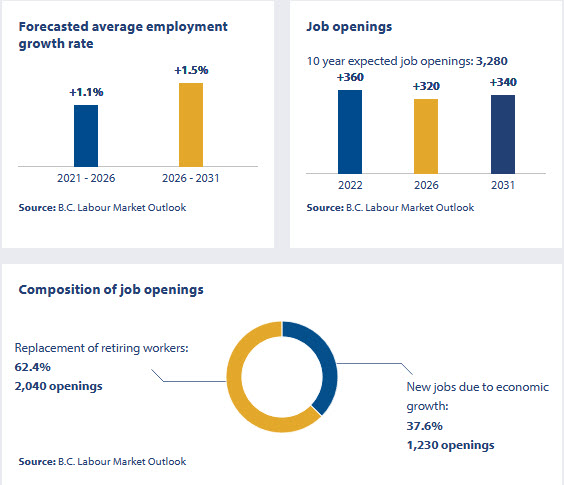Working as a Physician

Industry Overview
Industry sources report that there is a strong demand for general practitioners [GPs] throughout British Columbia due to a growing and aging population. Smaller, northern, rural communities are in particular need of GPs.
In response to this shortage, the Government of British Columbia has increased opportunities for medical education by establishing medical programs four distinct sites across the province: the Island Medical Program, Vancouver Fraser Medical Program, Southern Medical Program (Okanagan) and Northern Medical Program. Even so, there are still not enough graduates to replace the family physicians who retire every year. As a result, B.C. is increasingly dependent on importing physicians from other Canadian and international jurisdictions.
If you move to rural communities to practise you may receive incentives such as signing bonuses, student loan reductions, fee-for-service and flat sum premiums, or travel subsidies.
Job Outlook in BC, 2021-2031

Chart from WorkBC
WorkBC provides job openings in BC regions from 2021-2031:
| Region | Employment in 2021 |
Average Annual Employment Growth |
Expected Number of Job Openings |
| Vancouver Island | 1,440 | 1.5% | 650 |
| Lower Mainland / Southwest | 5,490 | 1.4% | 2,010 |
| Thompson-Okanagan | 1,010 | 1.2% | 400 |
| Kootenay | 270 | 0.6% | 90 |
| Cariboo | 310 | 0.4% | 80 |
| North Coast & Nechako | 150 | 0.6% | 40 |
| Northeast | 60 | -0.2% | 10 |
You can learn more about working as a physician in BC from:
Types of Employers
General practitioners and family physicians usually work in private practice, including group or team practices, hospitals, and clinics.
Senior physicians may also work as hospital administrators, teach and / or conduct research at educational institutions, or work for government health authorities and other health related organizations.
Salary & Working Hours
The median annual salary for physicians in BC is $164,237.

Most general practitioners are self-employed, which means you run your own clinic or office. You are paid directly by the government, and the amount you make depends on how many patients you see and the medical procedures you perform. If you are self-employed you spend some of your income on office expenses, supplies, insurance premiums and staff, therefore; your net income is less than the amount received from the government.
If you work for hospitals and other medical organizations you will likely receive benefits in addition to your salary. Benefits may include health and life insurance, pension plans, and paid vacation and sick days. If you are self-employed you must supply your own benefits.
From WorkBC and Career Cruising database.
Working Hours
Physicians often work irregular hours, including nights and weekends. You may also be on-call 24 hours a day when required to respond to emergencies. Resident physicians generally work long hours, which could be up to 60 hours per week.
